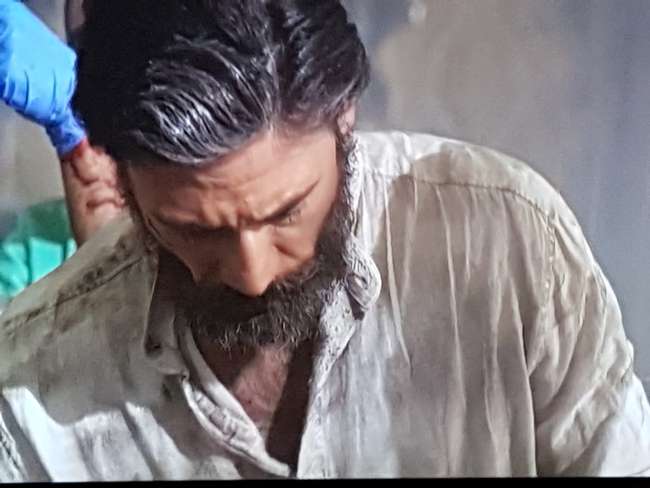Don Curry meets Jesus Christ
Argitaratu: 14.01.2017
Harpidetu Buletinera
Don Curry is not feeling well. He suffers as passionately and devotedly as only a man can.
The day had started off really well and unexpectedly spicy. On his way to breakfast, Don Curry saw 'his' castle in daylight for the first time. Although there were clear signs of aging and wear, it did not diminish the special charm and character of the place. Breakfast was served as a buffet, but since - as is almost always the case in Indian hotel restaurants - there were too many waiters present, one would always come by and ask what one wished for. When Don Curry was asked for an omelette, he did not refuse; however, the fact that the egg dish was generously seasoned with green chilies caused a buildup of heat in the taste buds of his tongue early in the morning. Don Curry quickly cooled off with some milk-rich muesli and then made his way to the reception. There, he should hire a guide for 90 minutes.
Shekhawati is a region in Rajasthan that was once located on a branch of the Silk Road. This not only made the local rulers immensely wealthy, but also several merchant families. While the rulers gradually squandered their fortune in constant wars against each other, the merchants passed on the money within their steadily growing families and increased it through their own businesses. From the mid-19th century onwards, it became a status symbol for all families of the now widely branched trader clans to build huge residential complexes with at least three inner courtyards and to have them painted inside and out with colorful frescoes. These special merchant houses are called Havelis and are considered the true treasure of Shekhawati. There are still thousands of them, but since the construction, neither the building material nor the paintings have been restored, a large part of them already resemble ruins, and many others are also on the verge of decay. It was only recently that the region was discovered for tourism, and only since then have mostly private individuals begun to restore particularly beautiful Havelis.
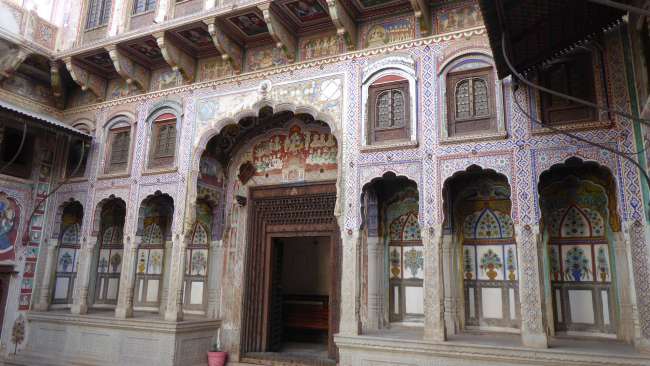
Sympathetic Mr. Singh was already ready to show Don Curry the best Havelis in his hometown Mandawa. With extremely fast speaking speed, he rattled off numbers, data, and facts and then gave Don Curry sufficient time to take photographs in each Haveli. The well-preserved Havelis, by the way, are usually inhabited, but the family usually has no problem allowing interested foreigners into the first courtyard.
As a final stop, Don Curry was dragged to a friend of Mr. Singh's who sells the works of a women's cooperative: colorful textiles of all kinds. Don Curry showed some interest in a tapestry created in patchwork technique. However, most of the products were covered with glitter, rhinestones, metal plates, etc. - bling bling, as the seller aptly put it. 'Italians like bling bling, Germans don't', Mr. Singh said. That's true, Don Curry silently agreed at least to the second part of the statement. But in the end, he had selected a tapestry without any bling bling, negotiated the price smoothly, and paid for it in the shop across the street - the cooperative does not accept cards.
That was the wonderful stay in Mandawa. Mr. Sanjay would like to rush straight to Jaipur, but Don Curry had other plans: two stops on the way in Shekhawati. First, he visited the medieval castle in Dundlod, which, for an entrance fee of around €0.30, showed the ticket seller/tour guide/coffee shop owner personally and enthusiastically, but due to a lack of knowledge of English, provided very little information.
The visit in Nawalgarh, on the other hand, was more informative, where Don Curry also wanted to visit the remains of the fortress as well as a Haveli museum in order to get the opportunity to explore such a building in its entirety. Mr. Sanjay initially stopped at the museum, which is well signposted. After Don Curry had already looked at the first rooms, a very elegant young Indian joined him to offer his services as a guide; he had heard what the tourist from Germany wanted to see. In Nawalgarh, word seems to spread at the speed of light...
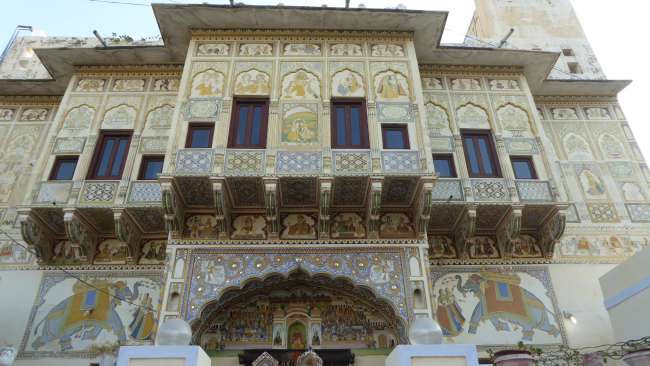
The guide turned out to be a history student with a great interest in art and architecture, spoke perfect English and French in addition to Hindi and his local dialect, and could hardly be stopped in his flood of knowledge. Mr. Singh in Mandawa had been well-informed, but the guide in Nawalgarh easily overshadowed him. As Don Curry's two sightseeing wishes gradually turned into an extensive city tour, he had to cut short the young Indian's speech unfortunately. However, there was one more thing he wanted to show him: just 10 meters from Mr. Sanjay's car, in the middle of Indian gods and British cyclists, a very famous picture adorns a Haveli: the blessing Jesus Christ in a classic representation from the 19th century. Naturally, Don Curry was curious as to how Jesus ended up on a merchant house in a small Rajasthani town. Smiling, the guide explained that all the exterior paintings of the Havelis were intended for the entertainment and education of the population. No Briton had ever ventured into such a remote small town, but the common people also constantly heard how these Britons determined everything. That made them curious: what did these foreigners look like? How did they live? What god did they believe in? Therefore, there are exotic depictions of trains, steamships, bicycles, smoking women, etc., and a total of 3 depictions of Jesus Christ on the outside of many Havelis. Once, even - unfortunately 80 km away - with a cigar in his mouth: after all, an artist also has his own imagination...
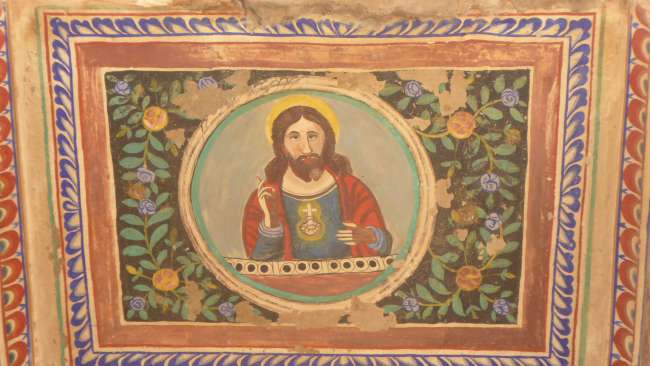
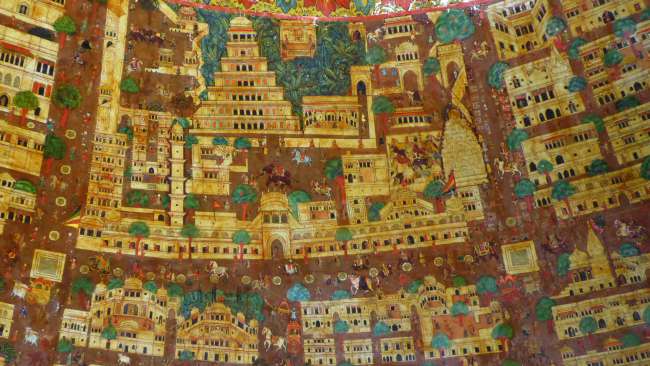
Gratefully, Don Curry said goodbye to his spontaneous guide, and it continued quickly towards Jaipur. Since the lunchtime was almost over, Mr. Sanjay stopped a few dozen kilometers further at a kind of roadside restaurant beyond any town. It was called 'Midway' and had only one other driver with customers as guests. Even though he wasn't really hungry, Don Curry ordered fried vegetable balls (Pakoras) and freshly squeezed orange juice. Eating without much appetite, he soon witnessed the arrival of a large Chinese tour group and their procession of toilets: out of the bus and into the bus.
Finally, they continued, but after two more hours of driving, Don Curry suddenly felt a strong rumbling in his lower abdomen. Brief, painful cramps were replaced by a feeling of leaden discomfort. Although Mr. Sanjay suggested a visit to a temple in Jaipur, Don Curry only wanted one thing: to go to the hotel, to the room. When he finally developed chills, followed by cold sweats and then severe headaches, Don Curry began to suffer - and suffer a lot. Completely exhausted, he shivered his way into restless sleep...
Harpidetu Buletinera
Erantzun
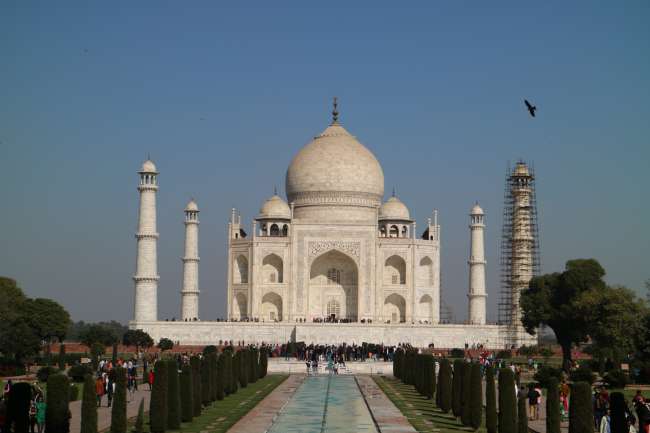
Bidaien txostenak India

